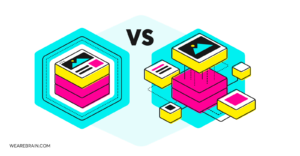Which e-commerce platform is best for you?

If you are thinking about starting your own e-commerce business, you will find this guide very useful: How to start your e-commerce business from scratch.
The post-Covid ‘new normal’ economy has forced businesses around the globe to bolster their online presence, birthing a paradigm shift in focus regarding their online sales and services. This has led to an unprecedented spike in demand to channel much of their sales focus into the e-commerce realm at a breakneck speed.
But how do you choose which e-commerce solution is best for your business? Well, as it turns out, this is not a simple task as each platform has its associated benefits and hindrances which can only be viewed as such when applied to your specific business model. To understand a bit about each platform (and the correct spelling of e-commerce) and what they can offer your B2B or B2C business, join your friends at WeAreBrain for a quick dive into comparing 5 of the best e-commerce platforms on the market.
Let’s get started.
SAP Commerce Cloud
SAP Commerce Cloud is perhaps the most superior CMS on our list for the development of large-scale online stores and various other e-commerce projects, which also includes solutions for B2C and B2B fields. If your business model relies on running a massive online marketplace with diverse sales capabilities and functionality suited to large-scale operations, then SAP Hybris is your most reliable option. It handles heavy traffic caused by the demands of both B2C and B2B business requirements with ease.
SAP Commerce Cloud is a leader in omnichannel fulfillment, allowing businesses to implement multiple sales channels into the platform for a centralised management system of superior quality and functionality. SAP Commerce Cloud is also integrated with all SAP solutions, which creates automated interactions between different departments and specialisations for increased efficiency and a seamless workflow.
However, SAP Commerce Cloud may not be for everyone: the cost of licensing the software is pricey (roughly USD 54,000 per year) and setting up, implementation, and ongoing updates are costly as they require qualified developers who don’t come very cheap.
Features and functionalities:
- Product content and catalogue management
- B2B and B2C modules
- Multi-channel commerce
- Built-in SEO optimisation tools
- Sales performance management
- Salesforce automation
- Subscription order management
- Versatile document management
- Customer financial management
Magento
Primarily targeted toward medium and large enterprises, Adobe’s Magento is another major player in the e-commerce space, and for good reason. It is open-source which provides businesses with a lot of flexibility when it comes to modifying source code for full customisation according to needs and requirements. Furthermore, it allows for third-party integration which gives businesses freedom of choice when selecting affiliates.
Magento has a really wide stack of features which help to manage multiple stores across a number of locations and languages, even varying pricing in different currencies. You can even change the prices of products according to groups (VIPs, loyalty programmes, etc.). Due to its popularity, there is a large Magento community offering quick support and even various plugins and extensions, so you’re never alone. But for larger enterprises requiring robust technical guidance, official support is only provided to Magento Enterprise users.
The platform is super scaleable, ensuring growth of your platform in unison with the growth of your business. If you have big dreams but are required to start small, Magento allows you to increase your functionality based on your requirements every step of the way.
Magento can be rather pricey if you are looking to leverage its full suite of offerings. Prices range from around USD 2,000 per month for SME solutions, right through to between USD 50,000 – USD 200,000 annually based off of your business’s Annual Gross Revenue (AGR).
Features and functionalities:
- Web design
- Shopping cart
- Customer service
- Order management
- Mobile commerce
- Product management
- Search engine optimisation
- Marketing
- Analytics and reporting
- Multiple websites
Salesforce Commerce Cloud
Salesforce Commerce Cloud is another prominent cloud-based Software-as-a-Service (SaaS) e-commerce solution boasting a superior CRM system to the other platforms on our list. The cloud-based functionality allows businesses to operate from anywhere, anytime. Apart from the obvious advantages of having a powerful CRM, an added benefit is that it is very popular, meaning you will easily find sales reps and employees who are familiar with the software.
Salesforce Commerce Cloud is an incredibly customisable platform, giving businesses the freedom of flexibility according to their specific requirements. There are a host of report widgets on offer to help you analyse your business performance from various perspectives. You are also able to add and remove tools that you don’t need, meaning you can reduce the clutter of your dashboard.
On the downside, setup and configuration are complex and time-consuming, especially from SMEs who do not have a dedicated IT team on hand. To make this matter less desirable, the official technical support offered by Salesforce is notoriously lousy. It’s also rather expensive for most SMEs, ranging from USD 25-USD 300 per month, per user. If you have a large team these costs add up, a lot.
Features and functionalities:
- Account and contact management
- Opportunity management and score
- Lead management
- Sales data
- Real-time visibility
- Drag-and-drop interface
- Dashboards
- Visual workflow
- Web-to-lead capture
- Lightning platform
- Web services API
- Google apps integration
BigCommerce
BigCommerce is a powerful, all-in-one e-commerce platform tool aimed at helping businesses grow their operations without the hassle and complexity. Users can manage their entire product catalogue within the easy-to-use control panel, automate sales taxes with built-in Avalara Avatax (or BigCommerce’s custom tax tables), and enable customers to initiate refunds or partial refunds through their account.
One of the major draws for businesses when choosing BigCommerce is its fantastic array of built-in marketing features. For businesses just starting out requiring versatile and powerful marketing functionalities, BigCommerce allows efficient go-to-market options. With Google Shopping and eBay integrations, alongside great Google Ads generators and solid SEO features, it makes this a great e-commerce platform choice for startups through to large-scale businesses.
As a pro or con (depending on how it suits your business), BigCommerce offers fewer third party app integrations as its competitors due to the desire to carefully curate who they are affiliated to. This is to ensure their clients trust them to select the best quality affiliates. In terms of cost, BigCommerce Standard sets you back USD 30 per month, with options through to Pro at USD 250 per month. Enterprise options available on a quote basis.
Features and functionalities:
- Marketing and conversion tools
- Mobile cart conversion
- Built-in blog for content marketing
- Social sharing for products and purchases
- Side-by-side product comparisons
- Public and private wish lists
- Mobile optimised
- Dropshipping management
- e-commerce analytics
- Sales management
- Built-in tax calculator
- Catalogue API
- Login and cart API
- Single-page checkout
Shopify
Arguably the most well-known e-commerce platform out there, Shopify markets itself as an easy-to-use, simple e-commerce tool which requires little to no technical or design know-how to build your own online store. It offers a wide range of templates with drag and drop functionality, as well as features to customise and design a site from scratch.
Shopify’s fully equipped CMS allows businesses to manage most aspects of their business operations, including functionality and layout. They have freedom of movement with the management of their platform thanks to its mobile management apps. Of course, the platform is fully responsive ensuring users can browse and purchase across a range of devices. Support is king here, as Shopify’s technical support is available across multiple channels, 24/7.
With unlimited hosting for their stores, unlimited products for businesses, and in-depth analytics, Shopify is perfect for SMEs looking to get up and running quickly and efficiently, with a wide range of features and functionalities. Shopify is the only platform on the list which offers a free 14-day trial. Thereafter, you can choose from monthly payments ranging from USD 29 per month to USD 299 per month.
ShopifyPlus caters to large-scale enterprises and high growth brands requiring far more features and functionalities to host larger volumes of traffic and data. This is Shopify’s direct competition to many of the enterprise solutions on our list. The platform allows for unlimited staff accounts and is powerful enough to handle over 10,000 transactions per minute.
ShopifyPlus works similarly to Shopify, it just offers more advanced features and detail. For instance, a ShopifyPlus account allows you to access shipping scripts to configure more precise rates on each product. You can also customise and edit your checkout page (which Shopify doesn’t allow), plus you are also given access to your own dedicated launch manager who works with you to set up and design your site and provides code to suit your specifications.
Pricing for ShopifyPlus is available on a quote basis, but it can start at around USD 2,000 per month.
Features and functionalities:
- 70 payment gateways
- Translate in 50+ languages
- Integrate with Dropshippers or Fulfillment Centers
- Shopify Mobile – update your store or inventory
- Search engine optimised
- Product reviews, discount codes and coupons
- Gift Cards
- Full blogging platform
- Mobile commerce ready
- Social media Integration
- Unlimited products
- Secure shopping cart
- Sell on Facebook
- Sell in-store (POS)
Which is best for you?
As you can see, there is a lot to consider when deciding which e-commerce platform to use for your business. Each platform has its associated benefits and drawbacks, but can only really be seen as such when applied to your business type and goals.
It is important to ensure your store can be easily updated and managed – this is a must. Your platform must be efficient and easy to use, not only by you but also by your customers so you need to ensure layout and functionality is intuitive and payment is simple. Make every effort to guarantee you have high-quality security measures in place, such as SSL, as securing the trust of your clients is paramount when making online payments.
We hope this has helped your decision to choose an e-commerce platform for your business a little easier!
Tanya Lyabik
Working Machines
An executive’s guide to AI and Intelligent Automation. Working Machines takes a look at how the renewed vigour for the development of Artificial Intelligence and Intelligent Automation technology has begun to change how businesses operate.







